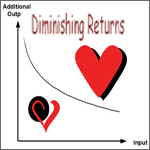
“Tis not the same self from year to year, nor are those we love; diminishing, complacency allows the love of a diminished person”
I have decided to right (write) certain wrongs within my own romantic life. When I look back at all my relationships, all my dates and all the failures and successes of my love life, I see one trend responsible for my disinterest; variance perceived at some point in time with each individual I have attempted a relationship with, the trend being “In love diminishing vs. out of love progressing.” To help analyze certain aspects of love, I will utilize an economic theory called diminishing returns as a foundation of why everlasting love is a representation of idealism rather than reality. If everlasting love is love that is infinite, then it must be recognizable from its origin to the present carrying into the future. However, idealistically this sounds comprehensible, but using the theory of diminishing returns shows us that everlasting love decays over time because as humans we become sensitized to motives, actions and gestures around us.
Diminishing returns is the economic theory stating if something in a production process has increased, while others parts of the production remain the same, the overall returns will decrease over time. Most of you are thinking, “How unromantic is comparing a economic theory to love?” Sometimes analyzing ideas from a different perspective will help us refine what is tarnished. If you read the definition of diminishing returns you can very well see the connection it has to sociological aspects of life. For example, if a person has a routine of saying “I love you” every morning to his wife during breakfast, hermeneutically the wife will eventually become sensitized to the man’s original motive of the first time he said it. It is only when something is altered in the routine that brings notice of a diminishing aspect. The phrase “I love you” becomes less meaningful the more it is used. Adversely, the effect of not saying the words “I love you” will impact the same way. Lets refer back to part of the definition of diminishing returns, “while other parts remain the same.” This critical phrase from the definition allows us to conceive everlasting love. If we can somehow use the tools of love in different ways, without changing the quantity and quality, then overall returns will rise positively if the changes bring forth positive influences. This posses the ultimate problem with everlasting love; do we have the conscience and wisdom to recognize the need for diversity in a relationship affirming everlasting love?
Let us refer to the quote “In love diminishing vs. out of love progressing.” The moment two people recognize their love; everything that is done from that point diminishes from its origin. For the same reason advertisers use new commercials, styles fade in and out, television shows go off the air and music genres evolve, the tools of love have to keep up with the change in relation to the other person, if not, then original love will diminish. It seems to me in my personal experience from the very moment I have fallen in love with someone, I tried my hardest to make sure it was natural and romantic. I examine the gestures I put forth because I want everything to have a special meaning, to have a reference of origin, but in doing this, I started a pattern of diminishing returns and never refined them to adapt to the present. I was just content with the original action as a memory, and thought that past images alone would be enough to carry on my view of love and romanticism. I learned quickly that my situation became “out of love progressing” because of the original sensitized actions and routines I had first laid out were now ideals of the past, thus striving for progression without substance in the present. When I use the phrases “In love diminishing” and “out of love progressing” it refers to the walking on eggshells and aspiring to please your significant other during the beginning of a relationship compared to the scraping for every last reason to confirm your love with someone toward the end, even though there might be no hope remaining because everything original has diminished before you. We become trapped in a cyclic pattern of diminishing returns where complacency overrides adoration.
With all that has been said, it seems we all are doomed in finding everlasting love. The purpose of this wasn’t to put you in despair, but to give you hope in that we may recognize the flaws that drive so many away from the origins, from the moments, from the experiences that were once termed love. Everlasting love is the idea that we don’t aspire to be happy, but rather aspire to make happy. Love is very much a verb rather than a noun and if we treat our entire relationships as we do the first moments, vicissitudes will endure beyond the diminishment of any loving gesture, action or motive. For every diminishing return, we must put forth something that replenishes.
I cannot love as I have loved,
And yet I know not why;
It is the one great woe of life
To feel all feeling die.
The sweetest joy, the wildest woe is love.
-Philip James Bailey